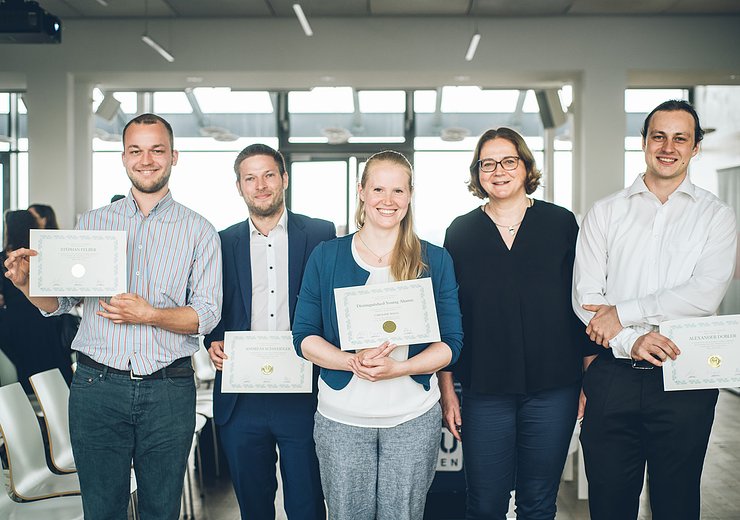“Attract, Retain, Promote” – The 34th Epilog
To promote academic excellence, we honored our most outstanding students in this semester’s award ceremony.

On 22 June 2022, we held our 34th Epilog before the breathtaking view of Vienna at TUtheSky. After a long period of online ceremonies, we were excited to welcome our students, their families, and the faculty to TU Wien once more. We celebrated the students’ success in an atmospheric award ceremony hosted by professor Stefan Woltran, Head of the Research Unit Databases and AI and Co-Head of the Center for Artificial Intelligence and Machine Learning (CAIML).
In her welcome address, Dean of TU Wien Informatics Gerti Kappel emphasized that to promote excellence, we must take an holistic view of students’ life cycles. “We need to attract, retain and promote our students to pave the way for our future talents. Starting in primary school, we are inspiring kids to study informatics. When they enroll with us, we provide first-rate education on pressing issues such as AI, sustainability, and ethical IT. And to promote the brightest to the next level, we introduced awards and programs like the ones you’ll be witnessing today.”
TU Wien Informatics’ most outstanding master’s students were competing for the Distinguished Young Alumn Award. Moreover, the prestigious Bachelor with Honors certificates and the Best Poster Award were awarded.
Distinguished Young Alumn
Each semester the most outstanding master’s students are awarded for their exceptional research work. The best four candidates were selected by a jury consisting of Margrit Gelautz, Schahram Dustdar, Robert Ganian, Peter Puschner and Michael Wimmer. Unfortunately, there can be only one winner - but remember that these four competing students are at the top of their year! The candidates competed for the title by presenting their excellent diploma theses. The judgment of the jury is based both on the written thesis as well as on its presentation.
Finally, Caroline Magg convinced the jury with her innovative approach to the “Development and Visual Assessment of a Cross-Modal Brain Tumor Segmentation Pipeline”. Her high-level thesis and presentation not only covered theoretical and practical aspects of the field and expertly addressed technical specifics but are highly relevant for future developments in healthcare. Magg received the Distinguished Young Alumn Award endowed with €1,500 for her outstanding research, supervised by Renata Raidou.
The further three best graduates who presented their diploma theses were also honored for their excellent achievements. Alexander Dobler showed us that complex networks are everywhere and how to solve hard problems with real-world graphs. He wrote his thesis about “Turbocharging Heuristics for Weak Coloring Numbers” and was supervised by Martin Nöllenburg.
Stephan Felber presented his thesis “On the Strongest Message Adversary for Directed Dynamic Networks“ in a very hands-on talk on an exceedingly complex topic – explaining what beer and postal services have to do with dynamic networks. He was supervised by Ulrich Schmid.
Andreas Schweidler proved that cycling is possible anywhere, at any time – at least if one overcomes the inner couch potato. He developed a virtual reality bike simulator in his thesis “Mixed Reality Bike – Development and Evaluation of a Virtual Reality Cycling Simulator”, supervised by Florian Michahelles.
Bachelor with Honors
Dean of Academic Affairs Hilda Tellioglu gave an overview of the “Bachelor with Honors” excellence program of the Faculty, enabling talented students to deepen their knowledge in various interdisciplinary fields. It inspires them to do scientific groundwork early in their academic careers and allows them to participate in industry internships and study abroad programs. This year, we had the most graduates since the start of the program, with eight students receiving their Certificates of Honors, including a personal letter of recommendation by the Rector of TU Wien, stating that they belong to the Top 5 percent of students at TU Wien. Philipp Danzinger, Alexander Firbas, Julian Haumer, Matthias Hetzenberger, Klaus Kraßnitzer, Timo Merkl, Lukas Rysavy and Christian Stippel are on the path to oustanding careers, many considering a PhD at TU Wien Informatics.
Voting for the Best Poster
Visualizing the complexity of research in a limited space is a challenging endeavor. Therefore, TU Wien Informatics staff were asked to vote for one of the nominees for the Best Poster Award. The lucky winner of the award, endowed with € 500, was Thomas Kolb with his poster presentation “Dynamic Sentiment Analysis for Measuring Media Bias”, supervised by Julia Neidhardt. Thomas Kolb is also part of the new CD Lab for Recommender Systems at TU Wien Informatics.
Curious about our other news? Subscribe to our news feed, calendar, or newsletter, or follow us on social media.














